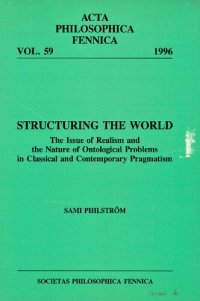
Ebook: Structuring the World: The Issue of Realism and the Nature of Ontological Problems in Classical and Contemporary Pragmatism
Author: Sami Philström
- Genre: Other Social Sciences // Philosophy
- Series: Acta Philosophica Fennica 59
- Year: 1996
- Publisher: The Philosophical Society of Finland
- Language: English
- pdf
From the Preface:
First of all, I must apologize for the length of this essay. Another thick philosophical book! The only explanation I can think of is the fact that in order to discuss, even nearly adequately, the complexities of the views of the individual thinkers associated with the tradition of pragmatism, one must let these philosophers speak for themselves. I have tried to do justice to them. Moreover, one of the key features of pragmatism — Jamesian pragmatism, at least — is individualism. I have tried not to reduce the difficult positions of individual thinkers to simple and general philosophical “isms”. Rather, I attempt to explain what such “isms” mean as ascribed to single philosophers.
From the Introduction:
As soon as one realizes that we all, inescapably, live our lives as members of one or another human community with both individual and social ends and purposes in view, one has almost become a pragmatist. This need not yet make us all pragmatists in a more philosophical sense of the word. Pragmatism, to give a somewhat loose and informal characterization, is the view that man’s practical purposes (individual and social alike) must be taken seriously in constructing philosophical explanations of the nature of the world as well as of humanity; moreover, man’s need to live within a human praxis, or different practices, must be recognized even with respect to his or her most theoretical aims and projects (including ontology, i.e., the philosophical project of finding out what there is in the world). In my sense, thus, pragmatism is such a broad doctrine that quite different thinkers can be classified as pragmatists. My list would include, say, Goodman, Quine, and Wittgenstein.
First of all, I must apologize for the length of this essay. Another thick philosophical book! The only explanation I can think of is the fact that in order to discuss, even nearly adequately, the complexities of the views of the individual thinkers associated with the tradition of pragmatism, one must let these philosophers speak for themselves. I have tried to do justice to them. Moreover, one of the key features of pragmatism — Jamesian pragmatism, at least — is individualism. I have tried not to reduce the difficult positions of individual thinkers to simple and general philosophical “isms”. Rather, I attempt to explain what such “isms” mean as ascribed to single philosophers.
From the Introduction:
As soon as one realizes that we all, inescapably, live our lives as members of one or another human community with both individual and social ends and purposes in view, one has almost become a pragmatist. This need not yet make us all pragmatists in a more philosophical sense of the word. Pragmatism, to give a somewhat loose and informal characterization, is the view that man’s practical purposes (individual and social alike) must be taken seriously in constructing philosophical explanations of the nature of the world as well as of humanity; moreover, man’s need to live within a human praxis, or different practices, must be recognized even with respect to his or her most theoretical aims and projects (including ontology, i.e., the philosophical project of finding out what there is in the world). In my sense, thus, pragmatism is such a broad doctrine that quite different thinkers can be classified as pragmatists. My list would include, say, Goodman, Quine, and Wittgenstein.
Download the book Structuring the World: The Issue of Realism and the Nature of Ontological Problems in Classical and Contemporary Pragmatism for free or read online
Continue reading on any device:

Last viewed books
Related books
{related-news}
Comments (0)